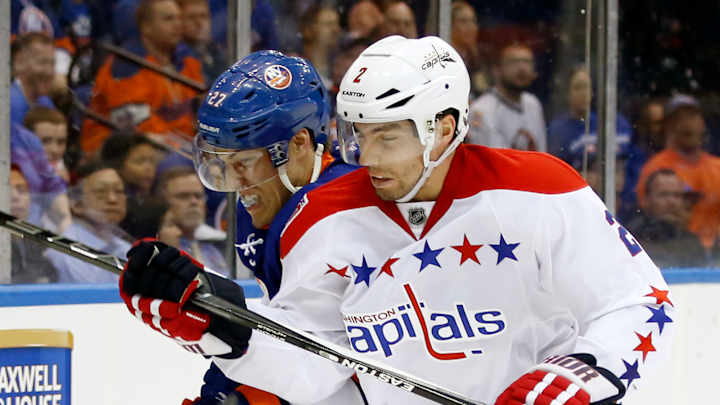NHL teams must adapt to 'novelty' of 3-on-3 OT this season

ARLINGTON, Va. (AP) Count Washington Capitals defenseman Matt Niskanen among those around the NHL taking a wait-and-see approach when it comes to the league's new 3-on-3 overtime.
A few things do seem clear about the setup: It will make goalies' stats uglier, result in fewer shootouts and force coaches to decide whether to focus on defense or an all-out attacking style.
''I wasn't really sure about it at first,'' said Niskanen, whose team hosts the New Jersey Devils in a season-opener Saturday. ''Now I think it's probably going to do what it was designed to do: Teams are going to get `grade A' chances, and if that's what people want to see, then let's do it. Fans are going to love it and the forwards are going to love it. Goalies and `D'? Maybe not as much.''
As the hockey season gets going this week, how teams deal with the switch from 4-on-4 in OT to one fewer skater per team could wind up having a real effect on the standings.
Consider this: A year ago, with 4-on-4 rules, 44 percent of overtime games were decided by a goal before they got to a shootout, according to STATS, about the same percentage that it's been in the 10 years since that format began in 2005-06.
But during this preseason, the first NHL test of 3-on-3 after it was tried in the AHL, 72 percent of OT games ended before a shootout, STATS said.
Factor in that nearly a quarter of all regular-season games over the past decade went to overtime, and what might seem like a minor rule change takes on more significance.
''I like the concept of it. I like more games being decided closer to where we're playing the 5-on-5 game - and less shootouts deciding games,'' Capitals general manager Brian MacLellan said. ''The shootout's been entertaining, but I think a lot of people within the league would like to see more games not decided by shootout.''
Buffalo Sabres coach Dan Bylsma pointed out that teams weren't necessarily using their No. 1 goalies in the preseason, which skewed the numbers. He also thinks coaches and players will adapt.
''We're going to be better defensively as it goes on, versus better offensively,'' Bylsma said. ''Right now, you're feeling it out.''
The expectation is that most teams will use two forwards and a defenseman, but that could change.
How much teams try to be the first to score as opposed to trying to control the puck and prevent goals might shift, too. Nashville Predators coach Peter Laviolette called 3-on-3 a ''tough thing to practice.''
''The majority of the goals are usually some sort of a transition goal or somebody falls down,'' Laviolette said.
As his goalie, Pekka Rinne, put it: ''I'm sure every team is going to go through a little bit of a learning curve.''
Buffalo's Bylsma and others, including Chicago Blackhawks forward Marian Hossa, figure one way teams will do things differently during 3-on-3 is to take care of line changes while in possession of the puck, instead of dumping it to the other end.
The first 3-on-3 overtime of the regular season was a wild affair. On Thursday night in Florida, the Tampa Bay Lightning beat Philadelphia 3-2 on a breakaway from defenseman Jason Garrison that capped an OT period filled with end-to-end action and even a penalty shot.
''How to describe it?'' Lightning coach Jon Cooper said. ''Lunacy. It's just constant (action).''
Tampa Bay outshot the Flyers 5-3 during overtime, and 32-25 for the game.
''There's definitely a lot of chances out there, and that's what the league was trying to get out of it,'' Flyers goalie Steve Mason said. ''I think we're going to see a lot of games ended in overtime just because of how wide open it is.''
Capitals forward Alex Ovechkin, who led the NHL with 53 goals last season, doesn't sound like someone in love with the idea of 3-on-3, even if he could be the sort of player who'll pad his scoring stats with more room to operate.
''It's not fun, because if you're stuck in the zone, you're going to be dead after that, obviously,'' the three-time MVP said. ''And you have to be smart with changes.''
His team's goalie, Braden Holtby, said he's ''indifferent'' to shootouts and the prospect of having fewer of them. He also isn't sure yet how he feels about 3-on-3.
''I think the novelty (of shootouts) has worn off a bit. If anyone thought it wouldn't when they implemented it, then they're a little bit crazy,'' Holtby said. ''Anything like that, that's a novelty, is soon to wear off. Just like this 3-on-3 will, at some point.''
---
AP Sports Writers Teresa M. Walker in Nashville, Tenn., and Jay Cohen in Chicago, and AP Hockey Writer John Wawrow in Buffalo, N.Y., and freelance writer Mark Didtler in Tampa, Fla., contributed to this report.
---
Follow Howard Fendrich on Twitter at http://twitter.com/HowardFendrich
